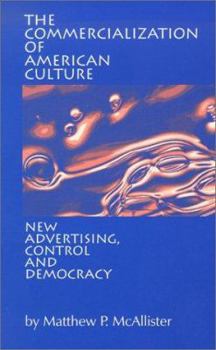The Commercialization of American Culture
Select Format
Select Condition 
Book Overview
Divided into eight elaborate and well-defined chapters that leave out almost nothing that′s relevant, Mathew P. McAllister-who is associated with the Virginia Polytechnic Institute-takes a graphic look at the advertising and consumer scene in America. . . . A bible, quran, bhagwatgita rolled into one for all concerned about a habitable universe." --Suresh Kohli in The Hindustan Times "This critical analysis should toss around American thinking on the subject of advertising as much as Vance Packard′s The Hidden Persuaders (1957) did. Matthew P. McAllister has written a classic, showing advertising′s invasion of everything--classrooms, doctors′ offices, sports arenas, concert halls, museums. . . . Systematically researched, organized, and documented, this book should be required reading for advertising and media students and for the general public."
Format:Paperback
Language:English
ISBN:0803953801
ISBN13:9780803953802
Release Date:November 1995
Publisher:Sage Publications
Length:312 Pages
Weight:1.00 lbs.
Dimensions:0.8" x 6.1" x 8.0"
Customer Reviews
1 rating
Interesting and Informative
Published by Thriftbooks.com User , 24 years ago
I bought this book after taking several classes with Dr. McAllister at Virginia Tech. It is basically a summary of Virginia Tech's Media Institutions course (which, as Dr. McAllister announces the first day, is entirely dedicated to anwering the question "How does the way media is funded affect the content of that media?") The book uses basic, real world examples to illustrate concepts and is written in a very conversational tone, much like the way Dr. McAllister lectures.The scope of the book is very broad; it touches on all major categories of media which are touched by advertising. It is an excellent survey or introductory book. It is not laden with undefined industry or academic jargon, so I would recommend it to people who have no formal training in media theory. However, as an academic research publication, it is not a book that should be approached as light, before bedtime reading material.If nothing else, this book should completely change the way one watches television, read the paper, etc. and should sensitize the average consumer to the deregulation and merging of major media companies (AOL/Time Warner, for example). Dr. McAllister manages to present the information in a non-threatening manner rather than taking the cynical, fear-appeal tone that many other authors use in their "big-media-is-bad" diatribes.A good companion book for this is Ben Bagdikian's "The Media Monoploy" which focuses more narrowly on the newpaper industry.






